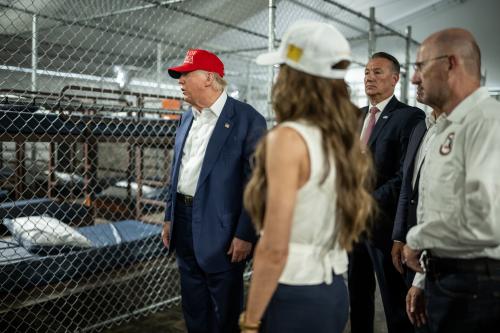Amnesty International calls it “shocking” and insists it “must be challenged.” Human Rights First complains that it “runs counter to one of the most important checks on unbridled executive power enshrined in the U.S. Constitution: the right to challenge imprisonment in a full and fair proceeding.” So, at the risk of marking myself as a supporter of unbridled executive power and an opponent of the rule of law, let me confess that I have no serious problem with this week’s opinion by the D.C. Circuit Court of Appeals on detentions at Guantánamo Bay, Cuba.
The court held both that Congress–not the executive branch–stripped the courts of jurisdiction to hear lawsuits from detainees at Guantánamo, and that it had the constitutional power to do so. As a legal matter, the decision is correct. And, if and when the Supreme Court reverses it, as it may do, the decision won’t be any less correct. The reversal will signify only that a majority of justices no longer wishes to honor the precedents that still bind the lower courts.
As the case heads towards the Supremes, you’ll no doubt hear a lot about suspension of the Great Writ of habeas corpus–the ancient device by which courts evaluate the legality of detentions. And you’ll also hear a lot about Guantánamo as a legal “black hole.” It’s all a lot of rot, really, albeit rot a majority of the justices might well adopt. Cut through it, and Guantánamo poses a set of difficult policy problems, not legal ones. And, while judges have a role in the solution to those problems, that role isn’t the one most liberals seem to want them to play.
Until the advent of the war on terrorism, nobody seriously believed that the federal courts would entertain challenges by aliens who had never set foot in this country to overseas military detentions–or, at least, nobody thought so who had read the Supreme Court’s emphatic pronouncement on the subject. “We are cited to no instance where a court, in this or any other country where the writ is known, has issued it on behalf of an alien enemy who, at no relevant time and in no stage of his captivity, has been within its territorial jurisdiction,” the Court wrote in 1950. “Nothing in the text of the Constitution extends such a right, nor does anything in our statutes.”
That all changed in 2004, when the court discovered that it did have jurisdiction over Guantánamo after all, under the federal habeas law. The court left it unclear whether its decision hinged on Guantánamo’s unique territorial status (it is sovereign territory of Cuba but leased perpetually to this country’s “exclusive jurisdiction and control”) or whether the habeas statute might extend beyond the base. In response, Congress amended the law to stop the flood of litigation that followed the Court’s decision. But the Court ruled last year that this new law did not apply to the hundreds of cases that were pending by the time of its passage. Undeterred, Congress followed up with a second statute that explicitly nixed the pending cases. It was this statute, part of the Military Commissions Act, that the court this week upheld.
Notwithstanding the passionate dissent in the D.C. Circuit case, the notion that this law somehow suspends the writ–a step the Constitution forbids except in cases of rebellion or invasion–is not credible. As a legal matter, it merely restores a status quo that had been relatively uncontroversial for the five decades preceding the September 11 attacks–that federal courts don’t supervise the overseas detentions of prisoners of war or unlawful combatants. The demand that they do so now is not one the Constitution makes.
All of which is not to say the Bush administration has behaved reasonably at Guantánamo–merely that its unreasonable behavior (and the law behind it) do not happen to violate the Constitution.
The administration’s fundamental mistake–the one from which all others flowed–was its dogmatic insistence both on a simple war paradigm for the current conflict and on an executive-power model for creating the rules to govern it. The war on terrorism presented challenges unlike those of any previous conflict. The indefinite nature of the war, the difficulty of distinguishing civilians from combatants, the global scope of the conflict, and the fuzzy line between its military and law enforcement dimensions all argued for a set of rigorous quasi-judicial procedures to define the status of those captured. Yet, instead of going to Congress and establishing new rules, the administration just adapted rules of warfare that were clearly outmoded by Al Qaeda and imposed them itself. None of this, in my judgment, was illegal. But it was uncommonly stupid. The result was a system that has the confidence of none of America’s international partners, one that many of its own citizens regard with opprobrium, and one that has erected huge burdens on liberty of some innocents.
Yet it’s important to understand these mistakes for the policy blunders that they were. And all the somber talk about the “rule of law” manages to obscure this critical fact. What’s more, these are errors that only Congress and the administration itself, not the courts, can really fix. Sure, the Supreme Court can reverse the D.C. Circuit and reinstate habeas jurisdiction over Guantánamo–yet again. But what then? Jurisdiction won’t create reasonable rules any more than it did last time. The law still won’t say how to evaluate a large group of people caught and held overseas who are not criminals and are not conventional wartime detainees either but may be too dangerous simply to release.
If the courts try to dictate how the executive branch should handle these detentions, they will be wading into some very deep water without a life vest. Overseas military action, after all, is an area about which judges know little and which is peculiarly resistant to principled legal decision-making. While any reasonable approach to this problem would likely make use of judges, who are highly skilled at reviewing evidence and holding it up against legal standards, it’s a big leap from there to letting judges define those legal standards and set the rules for handling the relevant evidence. The justices can pretend that the Constitution, international humanitarian law, or the laws of war answer the questions posed by the detentions. But it’s the wrong way to fix this system; it probably won’t work well, and its unintended consequences will, in any event, overwhelm whatever good it does.
Ironically, the outlines of a good system are already in place. Right now, military tribunals determine whether the administration has rightly classified a detainee as an enemy combatant, and the detainee can then appeal the tribunal’s judgment to a federal appeals court. The real problem here isn’t the lack of habeas jurisdiction. It is that these tribunals are too cursory. The detainee has no right to assistance from a lawyer and often doesn’t see the evidence against him. The consequence is that the tribunal that consigns him to indefinite detention has no clear picture of the evidence, and any reviewing court has only the most limited record to evaluate.
Yet in this flawed system lies the nucleus of a procedure better than either the current one or any attempt to supplant executive power with judicial power. The compromise would beef up the combatant-status tribunals, making them fairer and more robust–and clarifying the form of judicial review that would follow them.
For this to happen, both sides in the fight would have to give up some sacred cows. Human rights groups and lawyers for the detainees would have to drop their insistence on habeas corpus litigation as the essential mechanism of judicial review in this conflict. The administration would have to stop pretending that, legally speaking, this is a war like any other and requires no additional legislative imagination. Neither concession seems likely. So, instead, we’ll do another round of litigation before the branch of government least capable of resolving the problems at hand. And, however the Supreme Court eventually rules–even if we all collectively proclaim its decision some great victory for the rule of law–the United States will face the same problem it faces today.
The Brookings Institution is committed to quality, independence, and impact.
We are supported by a diverse array of funders. In line with our values and policies, each Brookings publication represents the sole views of its author(s).



Commentary
Op-edThe Courts Can’t Fix Guantanamo
February 22, 2007